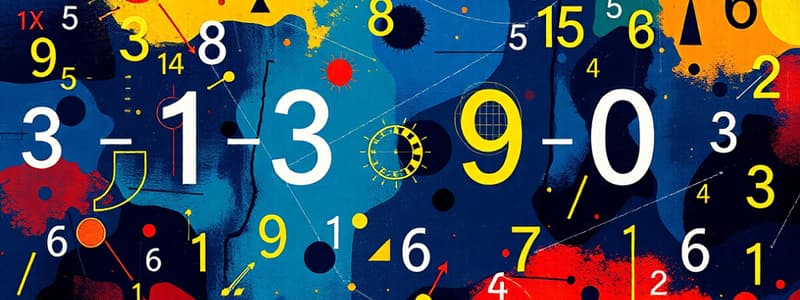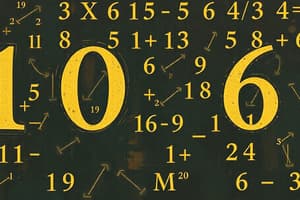Podcast
Questions and Answers
Which number system includes all the natural numbers, whole numbers, integers, and rational numbers?
Which number system includes all the natural numbers, whole numbers, integers, and rational numbers?
- Whole numbers
- Real numbers (correct)
- Complex numbers
- Irrational numbers
Which of the following is NOT a fundamental arithmetic operation?
Which of the following is NOT a fundamental arithmetic operation?
- Modulus (correct)
- Exponentiation
- Multiplication
- Division
In the context of algebra, what is a polynomial?
In the context of algebra, what is a polynomial?
- An equation with variables and coefficients
- A function that maps inputs to outputs
- An expression made up of variables and coefficients, combined using addition, subtraction, multiplication, and non-negative integer exponents (correct)
- A set of numbers that can be expressed as a fraction of two integers
Which geometric transformation involves changing the size and shape of an object?
Which geometric transformation involves changing the size and shape of an object?
Calculus deals primarily with which mathematical concepts?
Calculus deals primarily with which mathematical concepts?
Which of the following is an example of inductive reasoning?
Which of the following is an example of inductive reasoning?
Which of these is a branch of mathematics concerned with the collection, organization, analysis, interpretation, and presentation of data?
Which of these is a branch of mathematics concerned with the collection, organization, analysis, interpretation, and presentation of data?
What is the imaginary unit denoted by 'i' in complex numbers?
What is the imaginary unit denoted by 'i' in complex numbers?
Flashcards
Natural Numbers
Natural Numbers
Counting numbers starting from 1; 1, 2, 3,...
Rational Numbers
Rational Numbers
Numbers that can be expressed as a fraction p/q where p and q are integers and q ≠ 0.
Complex Numbers
Complex Numbers
Numbers in the form a + bi, where a and b are real numbers and i is the imaginary unit.
Variables
Variables
Signup and view all the flashcards
Derivatives
Derivatives
Signup and view all the flashcards
Probability
Probability
Signup and view all the flashcards
Deductive Reasoning
Deductive Reasoning
Signup and view all the flashcards
Statistics
Statistics
Signup and view all the flashcards
Study Notes
Fundamental Concepts of Mathematics
- Mathematics is a formal system of logic used to model and understand the world.
- It encompasses various branches like algebra, geometry, calculus, and statistics.
- Mathematics is characterized by precise definitions, axioms, and theorems.
- Mathematics is used in many fields, including science, engineering, and computer science.
Number Systems
- Natural numbers (counting numbers; 1, 2, 3,...)
- Whole numbers (natural numbers and zero; 0, 1, 2, 3,...)
- Integers (whole numbers and their negatives; ..., -3, -2, -1, 0, 1, 2, 3,...)
- Rational numbers (numbers that can be expressed as a fraction p/q where p and q are integers and q ≠ 0)
- Irrational numbers (numbers that cannot be expressed as a fraction of two integers)
- Real numbers (union of rational and irrational numbers)
- Complex numbers (numbers of the form a + bi, where a and b are real numbers and i is the imaginary unit; i² = -1)
Arithmetic Operations
- Addition (+)
- Subtraction (-)
- Multiplication (× or *)
- Division (÷ or /)
- Exponentiation (raising to a power; an)
- Roots (e.g., square root √)
Algebra
- Variables (symbols that represent unknown quantities)
- Equations (statements that two expressions are equal)
- Inequalities (statements that two expressions are not equal)
- Functions (relationships between inputs and outputs)
- Polynomials (expressions made up of variables and coefficients)
- Factoring (expressing a polynomial as the product of simpler polynomials)
Geometry
- Shapes (lines, angles, polygons, circles, etc.)
- Measurement (length, area, volume)
- Transformations (translations, rotations, reflections)
- Constructions (using compass and straightedge to draw geometric figures)
- Coordinate geometry (using coordinates to represent points and shapes)
Calculus
- Limits (approaching a value)
- Derivatives (rates of change)
- Integrals (accumulation of quantities)
- Applications in physics, engineering, and economics
Statistics
- Collection of data
- Organization of data (tables, charts)
- Analysis of data (averages, standard deviations)
- Probability
- Statistical inference
Logic in Mathematics
- Mathematical statements are often expressed in logical form.
- Deductive reasoning is used to prove theorems.
- Inductive reasoning is used to make conjectures based on observations.
- Logical operators such as AND, OR, NOT are crucial for establishing mathematical truth.
Sets
- A set is a collection of distinct objects (elements).
- Set operations such as union (∪), intersection (∩), and difference (∖)
- Set theory underlies many branches of mathematics.
Studying That Suits You
Use AI to generate personalized quizzes and flashcards to suit your learning preferences.




